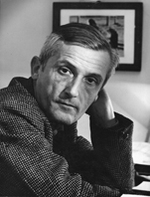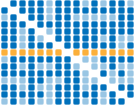1
Because all shall be abandoned then.
The silence of heavens parted forever
from those of the fallen fields at the world end,
again the dog-kennels’ silence.
Fugitive bird regiment in air.
And we will see the rising sun,
mute as a demented pupil of an eye,
and calm, as a watchful beast.
But keeping vigil in banishment,
because sleep is absent on that night,
I am a drift as its thousand leaves,
and I speak like the tree at night:
Do you know the wandering of years,
the years on the crumpled fields?
And understand the wrinkles of transience,
recognize it on wearied hands?
And do you know the name of orphancy?
And do you know, what kind of pain
treads here the eternal darkness
on split hooves, webbed toes?
The night, the cold, the pit,
the captive's twisted head,
do you know the congealed troughs,
the deep-world agony, do you know that?
The sun has risen. Slender trees stand dark
in the wrathful, infrared sky.
Thus I leave. Facing the destruction
a man proceeds, voiceless.
He has nothing but his shadow darkness.
And his staff. And his prison dress.
2
That’s why I learned to walk!
For these late, bitter steps.
Then evening comes, and the feces of night
petrifies around me, and under closed eyes
I carry over this wandering, this fever
precious trees with their little twigs.
Leaf by leaf the hot, tiny forest.
Once the paradise stood here.
The pain renews in half-sleep:
hearing its gigantic trees!
I wanted home, wanted to get home finally
as he arrived home in the Bible.
My dreadful shadow across the courtyard.
Wearied silence, aged parents in the house.
They are coming, they are calling,
poor ones already crying, hugging me stumbling.
The ancient order takes me back.
On windy stars I'm leaning.
If only once I could talk to you,
whom I loved so. Year after year
I never tired of saying it, as a child
cries into the crack of a fence
the slowly suffocating hope
that I would come and find you again.
Your closeness throbs in my throat.
I’m terrified like a wild animal.
Your words, the human speech
is unknown to me. There are birds,
who are fleeing with broken heart
under the sky, under the fiery sky.
Orphan wood slats stand in the searing field,
and motionless cages burn high.
I do not understand human speech,
and do not speak your language.
My words are more homeless than the words unspoken!
I don’t even have words.
Their horrible weight
pouring down through the air.
Voices come from the hull of a tower.
You are nowhere. How empty the world.
A garden chair, a deckchair left out.
My shadow clatters on sharp stones.
I’m tired, rammed into the ground.
3
God sees that I stand on the sun.
Sees my shade on rabble and fence.
Without breathing he sees my shadow
standing in the airless press.
By that I am like a stone,
Dead crinkle skin, drawing of a thousand groves,
by that the face of the creatures
are a good handful of gravel stones.
Wrinkles on the face for tears,
Empty furrows dripping, dripping instead of tears.




